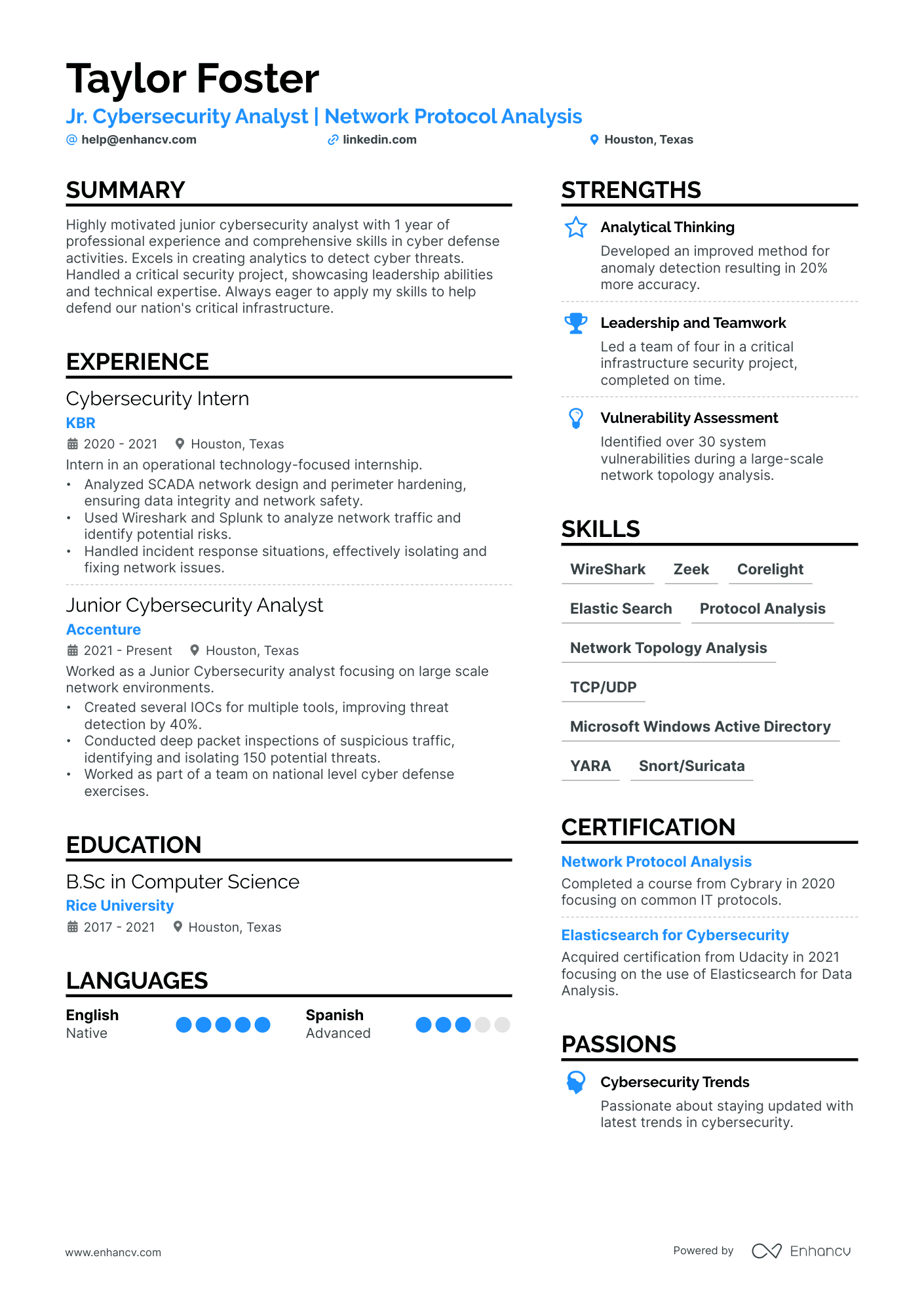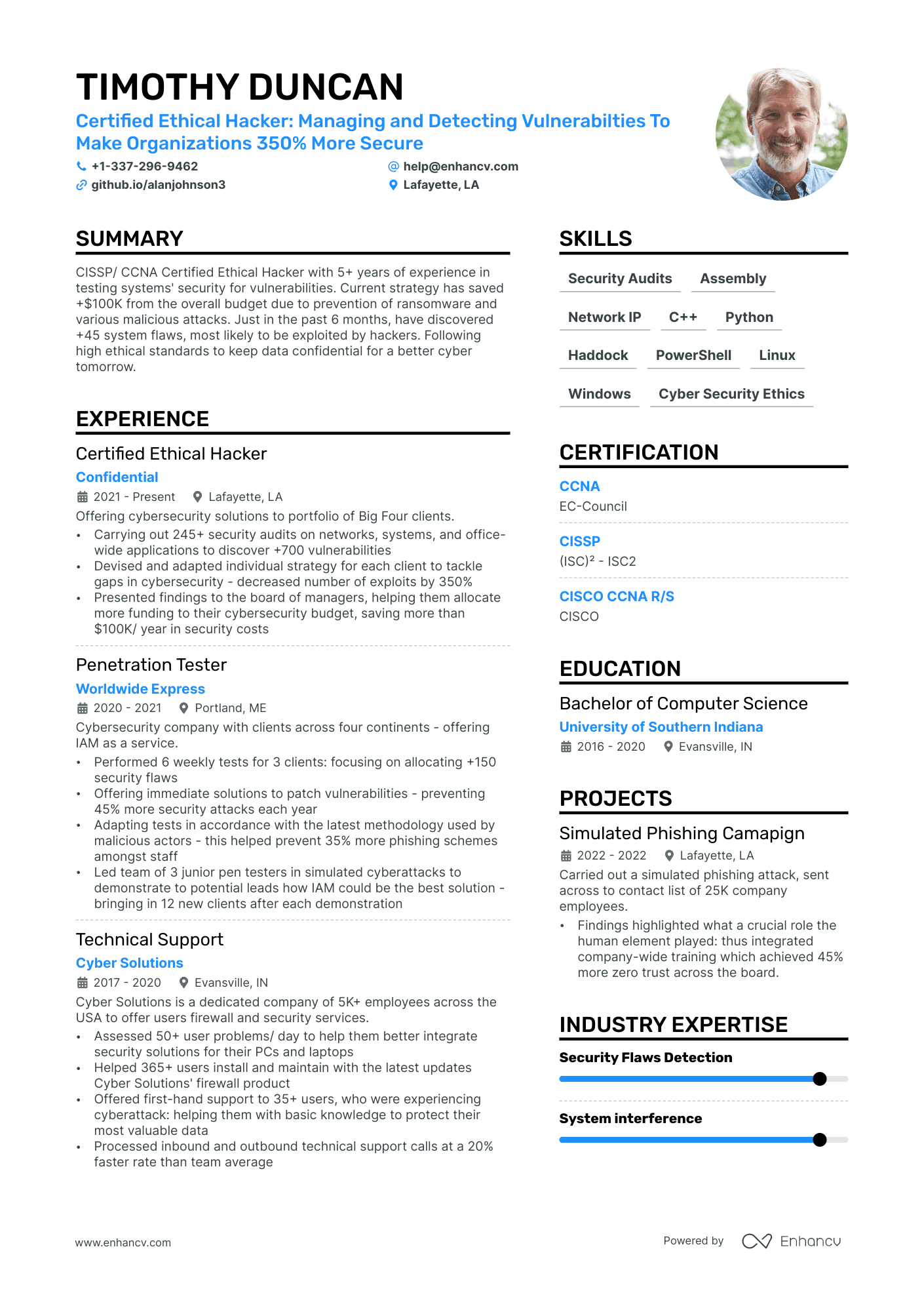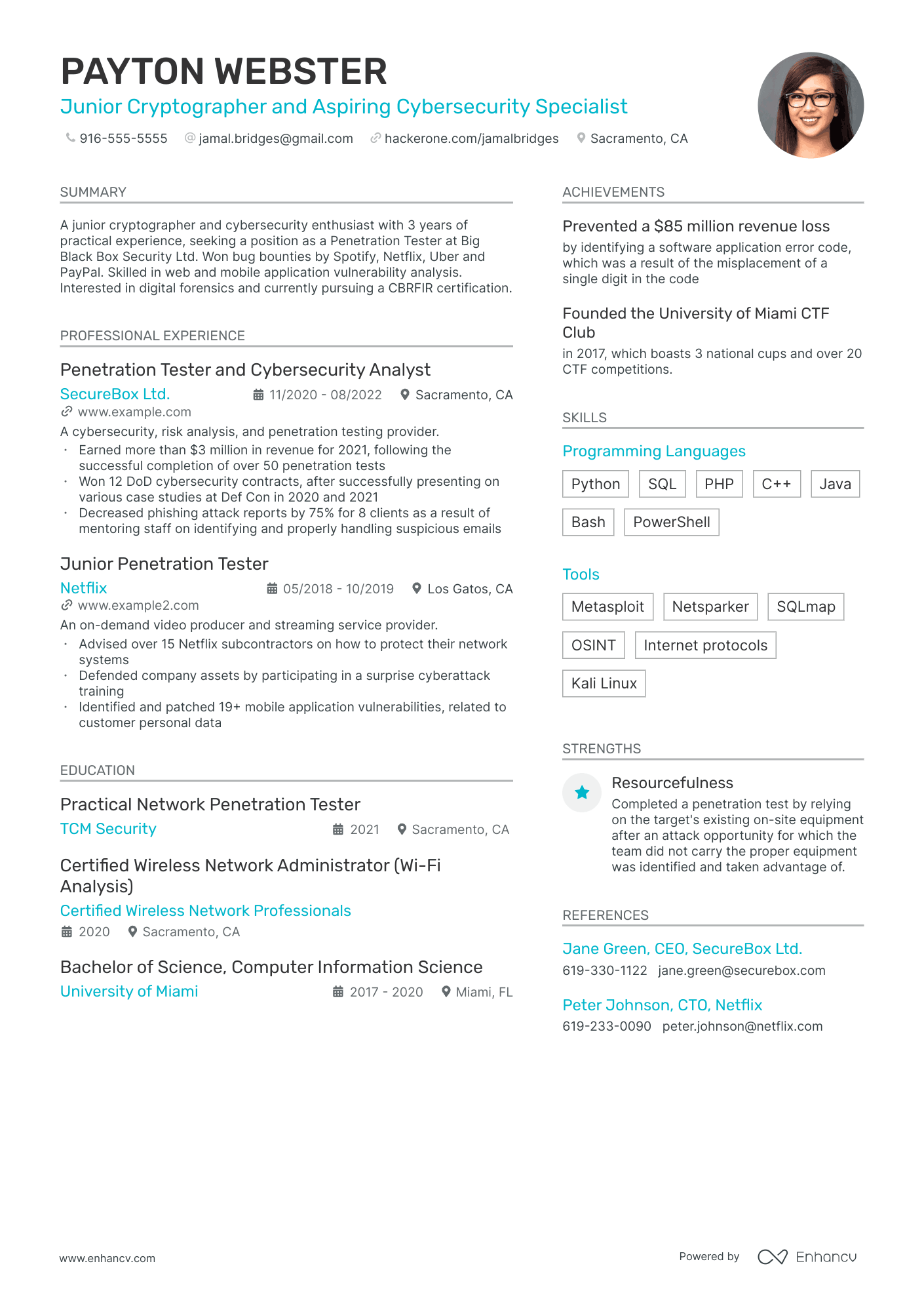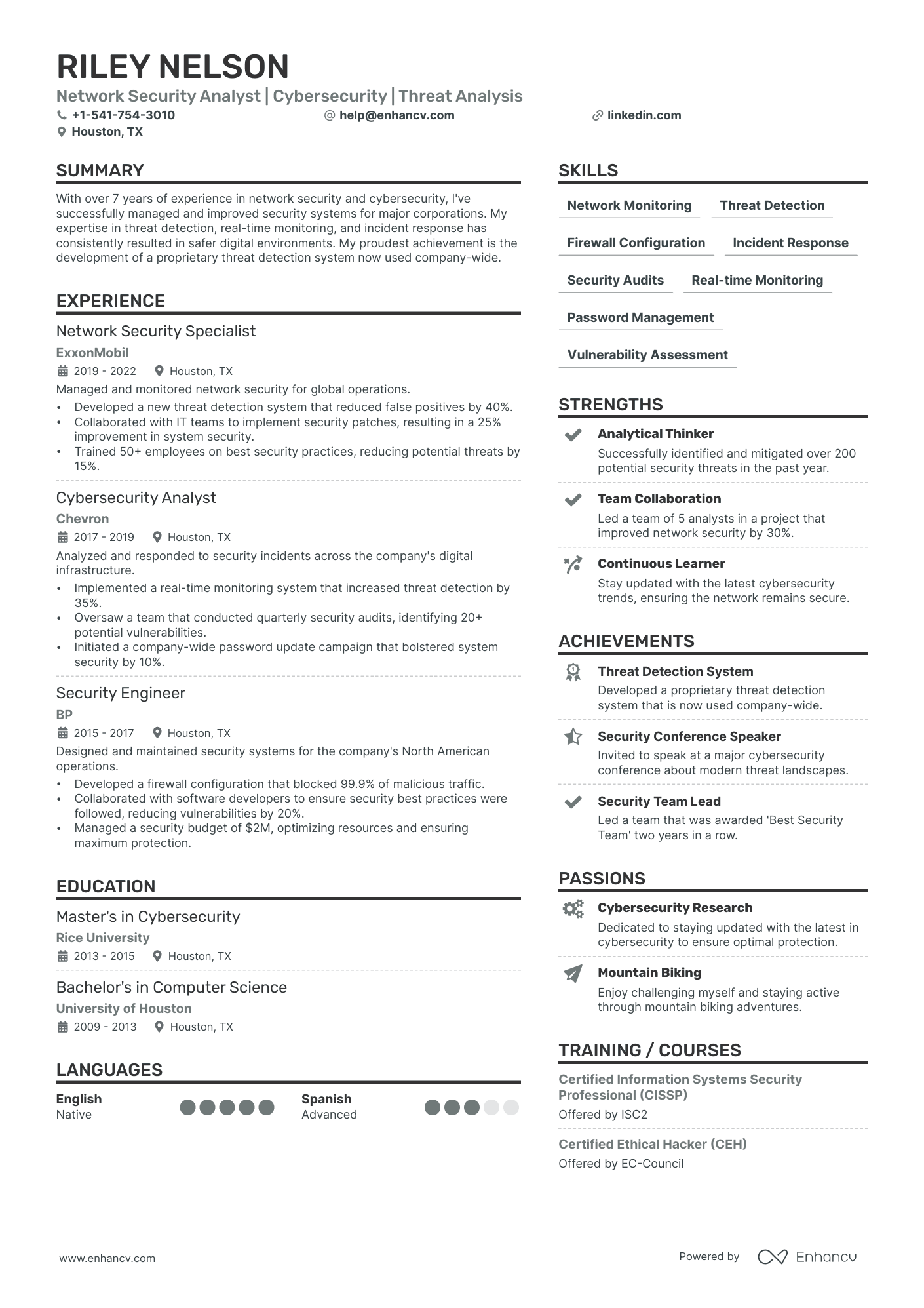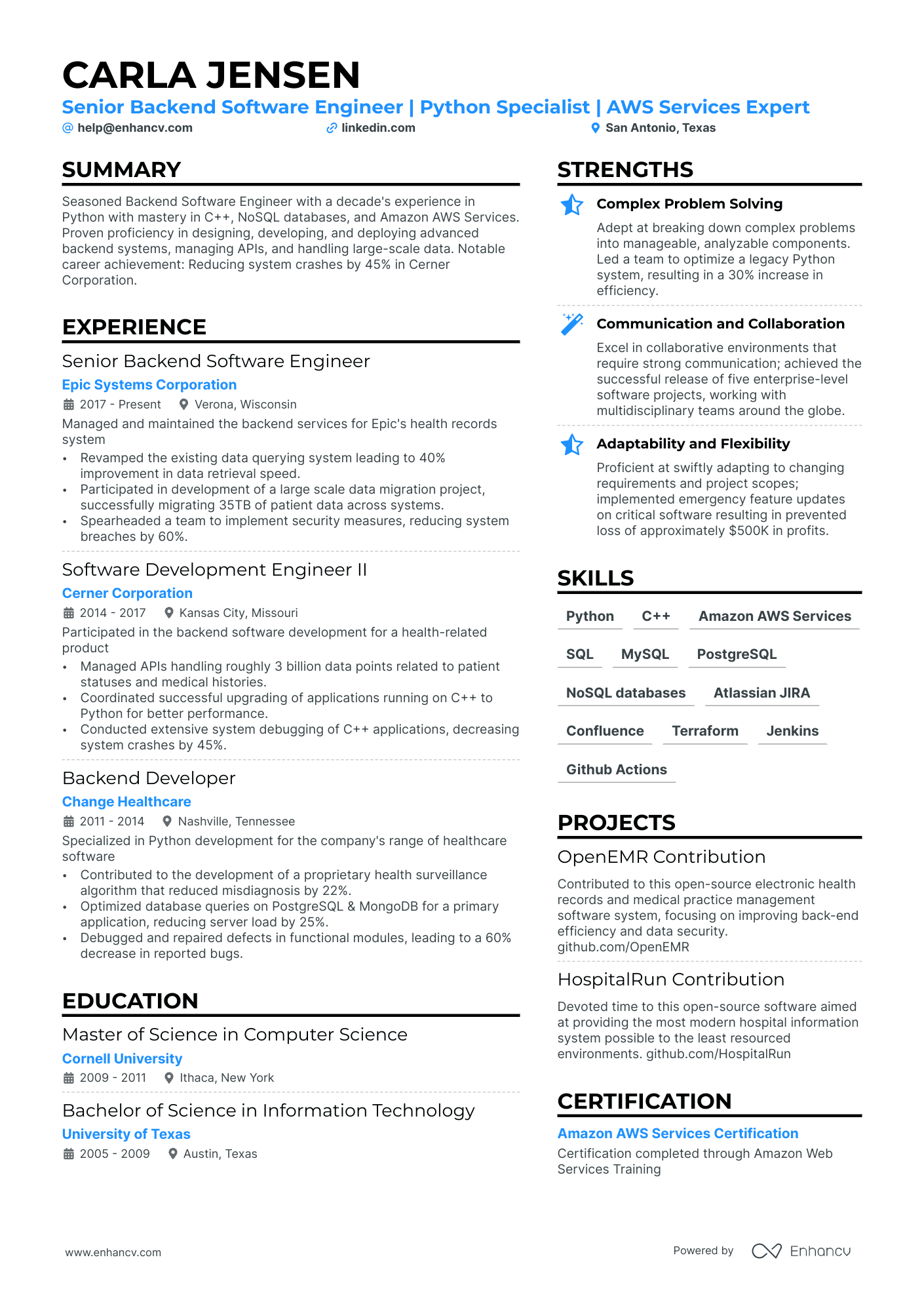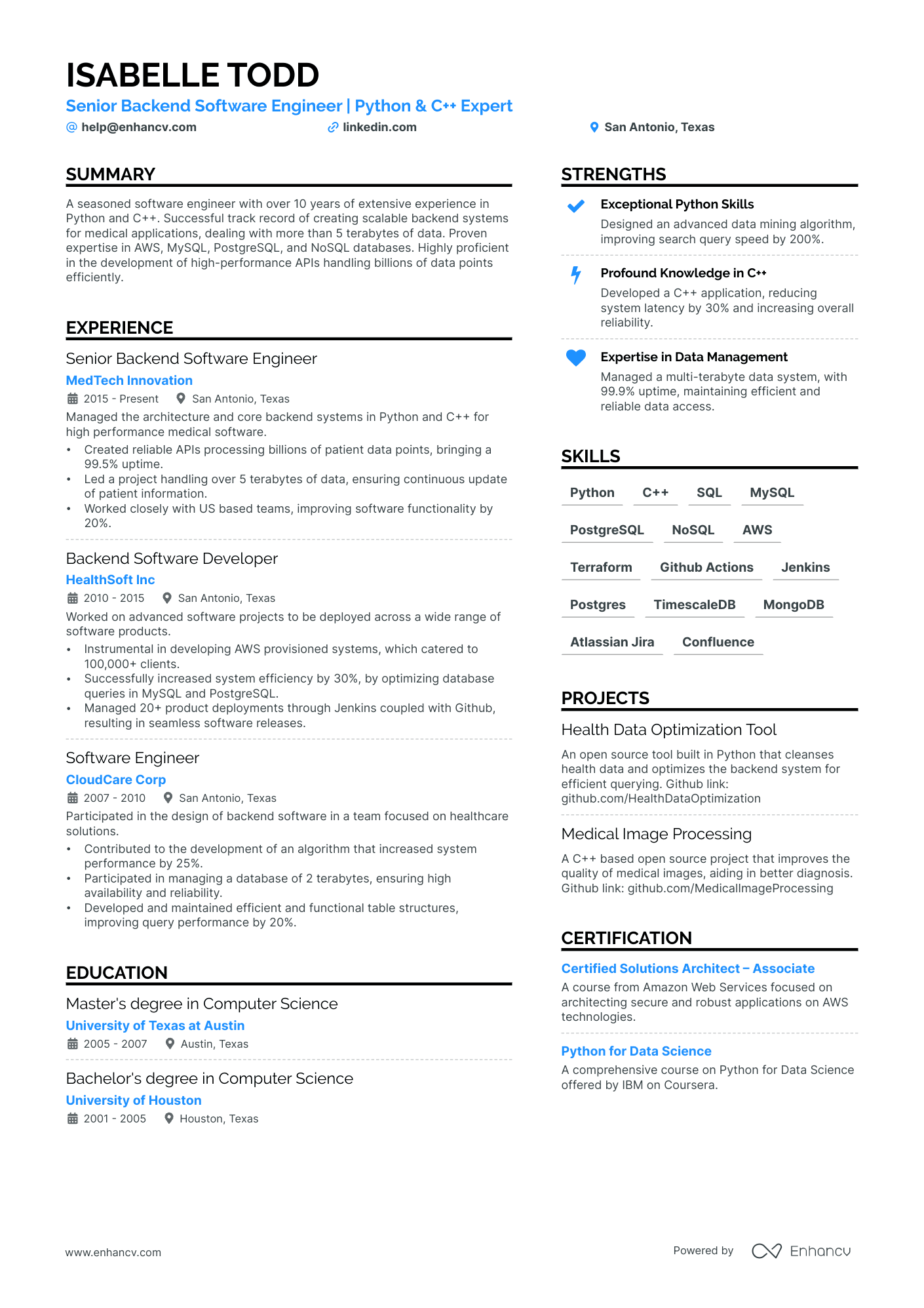So you have the skills to defend a network (and possibly hack it too).
But do you know how to translate them onto a job-winning resume?
If you don’t, your resume won’t get read, and it’ll be filed alongside the candidates who couldn’t fend off a script kiddie.
Luckily, you’ve found this guide, and you can save your thanks for when you get the job. But watch out for those vengeful blue hat hackers who you beat to the mark…
According to the BLS, cyber security analyst jobs are predicted to increase by 31% from 2020 to 2029, so now’s the perfect time to be on the hunt for a new role.
Get ready to land a job where you’ll hook the worms, quarantine the virus, burn the Trojan, neutralize spyware, unclog the DOS, and build a firewall that Dumbledore would be proud of. You’re a wizard.
Prove it in your resume.
This guide will show you how.
What you’ll learn here
- What a cyber security analyst Resume looks like, with templates and examples.
- Which resume sections you need to include.
- What qualifications and certificates are important, and how to list them.
- How to write clear and impactful sections that align with the job description.
- How to get the hiring manager to visualize what you can do.
How to write a cyber security analyst resume
Take a piece of A4 paper and fold it into 3 sections. Top, middle, and bottom. The top third is reserved for directly answering the hiring manager’s most pressing questions.
You have 5 seconds to capture their attention. But how?
Take their job listing and write a resume that matches. Take note of the keywords they use, and exactly what they’re looking for in the “Responsibilities” section of the job description.
Do they want an analyst who’s eliminated CVE’s using C++? Created hardware and software upgrades with a programming language? If you have it, flaunt it.
Emphasize all of the skills and qualifications they’re directly looking for.
Applying for your first cyber security analyst role? At a minimum, they need to see some kind of IT-related work. Do you have any experience with Homelab? TryHackMe? Hack The Box? Practical experience is a major asset as an entry-level cyber security analyst
Get recruiters visualizing your abilities using descriptive techniques, like CAR (Challenge, Action, Result). What was the challenge? The actions you took? And the results?
That’s the best way to build their confidence in you – before you ever meet them.
Top resume sections
- Header with your personal information
- A resume summary with an overview of your abilities
- Experience section to dive deep into your achievements and techniques
- Education & certifications sections
- Skills section that highlights the top requirements of the role
What recruiters want to see
- Examples of CAR (Challenge, Action, Results)
- Relevant certifications and proof of how you made use of your knowledge
- Proficiency with technologies and software
- Understanding of the requirements of the role
Cyber security analyst Header - The First Impression
Resume headers need to look professional and include all necessary information. Miss a step here and it might be game over before it’s even begun.
Don’t worry – simple, but crucial information presented professionally is all you need to do here.
It’s the first section the recruiter will see, so let’s start off on the right foot.
Your resume header should include:
- Your first and last name
- Job title and seniority level
- Location
- Email address
- Phone number
- Relevant links (portfolio, Github profile, personal website or LinkedIn)
2 cyber security analyst resume header examples
This header is missing the mark. It has nothing but an email address, a city and a name.
Unfortunately, he also made a mistake in the spelling of his email and now he’s unreachable.
Let’s fix this.
This one leaves a much better first impression.
This candidate has included multiple methods of contact, along with a link to their Github profile.
This shows great attention to detail.
Now that the header is written, let’s move onto writing the resume summary.
How to Write a Powerful Resume Summary
Just underneath your header sits your resume summary.
Your job with this section is to impress the recruiter in less than 5 seconds.
How do you do this?
By first reading the job description to see exactly what they’re looking for in their ideal candidate.
Then, mirror the same keywords that they use in your resume summary (as long as you truthfully have those skills).
This could be which technologies you’ve worked with to identify and prevent against threats, how you remediated security breaches, and the years of experience you have in cybersecurity.
Use the CAR (challenge, action, result) approach to write your resume summary.
Let’s take a look at two different examples.
2 cyber security analyst resume summary examples
This summary leaves important questions unanswered:
- What kind of cyber security analyst experience? How many years?
- What specific skills and technical knowledge does the candidate have?
- Which tools are they proficient with?
- What kind of impact did they make in previous roles?
Let’s take a look at a better example.
Your goal is to grab the attention of the recruiter and have them pick up the phone to call you in for an interview.
Using real figures and quantifiable data is the way to go. You can talk about:
- Years of experience
- Specific technologies used
- Actions taken
- Real results, such as money made or saved
What should you include in your cyber security analyst experience section?
Congrats! The recruiter was impressed by your summary and wants to deep dive further into your experience.
Use the experience section to expand on your previous roles and the processes you used.
It’s all about the challenges you faced, the steps you took to remedy them, and the impactful results you achieved.
Now is not the time to be shy about your achievements – recruiters want to build the confidence that you have what it takes to succeed.
Let’s look at some examples:
cyber security analyst resume experience examples
- •Helped to engage cyber threats in a timely manner, taking the necessary steps to contain and neutralize the attacks as part of a team
- •Implemented and enhanced company security measures
- •Determined weaknesses in infrastructure security
You can’t be this vague and still expect to land an interview!
Anyone can simply list out responsibilities on their resume. Stand out by weaving in achievements and quantifiable results.
You have to expand and be specific.
Let’s see this in action:
- •Lead repair of OS after detaining and neutralizing DOS, Trojan, and other malware attacks, saving the company an estimated $400,000 over 2 years.
- •Configured and maintained company’s first Devo SIEM antivirus system in the first month after identifying weaknesses in the initial security assessment.
- •Ran development and maintenance of IAM and led the encryption protection of cloud security.
- •Maintained an MTTR of 3.5 hours on average.
This section is much better!
It calls out specific keywords that were likely in the job description, and it makes an impact with real achievements that are backed up with data.
Does a cyber security analyst resume need an education section?
Your resume definitely needs its own education section. Here’s what you should include:
- Your degree
- University/college name
- Graduation year
- Bonus points: Notable projects
Many cyber security analyst jobs require a postgraduate degree or diploma in either Cybersecurity, Information Assurance, or another related field of study.
If you lack formal education, a few years of highly relevant job experience should be enough to make up for it.
Are certificates essential for cyber security analyst resumes?"?
Certificates are worth their weight in gold in the field of cyber security analyst.
There are plenty to choose from and each one is valued slightly differently from company to company.
Write a separate dedicated section for your certifications. List them out in order from the most relevant and recent. Include the name of the certification and the year you completed it.
Want some inspiration on where to start?
Here’s our list of the most popular and valuable cyber security analyst certifications in the industry:
Top 24 cyber security analyst certificates for your resume
- CSSIP
- CompTIA Security+
- CompTIA Pentest +
- CompTIA Network+
- CompTIA IT Operations Specialist
- CompTIA Secure Infrastructure Specialist
- CySA +
- GPEN
- GXPN
- OSCP
- CEH
- Sec+
- Az-500
- Sc-200
- CISSP
- OSEP
- OSWE
- SSCP
- CCSP
- NVAP
- NSP
- SAP
- GIAC cert. Incident Handler GCIH
- LPIC-I
Top skills to include on your cyber security analyst resume
cyber security analysts need both technical and soft skills to be listed in your resume skills section. Recruiters are looking out for proof of this in your resume.
Technical skills are the practical knowledge that you learned with your experience, training and education. This can include the programming languages you’re familiar with, your attack tools and techniques, and frameworks that you turn to.
Soft skills are the personality traits that make you a great asset to a team. They can be centered around your attention to detail, ability to communicate, your motivation to learn, or other admirable traits like those.
Just as with the summary and experience sections, your best place to start is by reading the job description. What skills are they listing as requirements and nice-to-have? If you have it, flaunt it.
Here’s a list of both technical and soft skills to get you started on the right track:
Hard / Technical Skills List
- Encryption
- Python
- Data analytics
- Automation
- DevOps
- Risk assessment
- Malware analysis
- Cloud security
- SIEM & vulnerability assessments
- Incident response
- Cryptography
- Information security (authentication, access control, authorization, audit)
- Application architecture
- IT governance
- Risk & compliance
- Industrial frameworks (NIST, MITRE ATT&CK, OWASP,PCI-DSS, ITIL)
- Understanding of ISO standards
- SQL
- Regulatory Compliance (SOX, FFIEC, 17A5)
Soft skills list
- Make presentations
- Communication skills (written & verbal)
- Work well with a team and individually
- Strong attention to detail
- Ability to meet tight deadlines
- Project management
- Management skills
- Problem solving
- Performs well under pressure
Key takeaways
- Read the job description to see what specific qualifications and knowledge is required, and then write your resume to reflect that.
- Don’t just list out the responsibilities of your past roles – expand on your achievements and back it up with real data.
- Use the CAR method (Challenge, Action, Result) to describe your abilities.
- Certifications are essential in a cyber security analyst resume. Read the job descriptions to see which ones are required. List out your certifications in their own section, starting with the most relevant one first.
Cyber Security Analyst resume examples
Explore additional cyber security analyst resume samples and guides and see what works for your level of experience or role.
By Experience
Junior Cyber Security Analyst
For Junior Cyber Security Analyst roles, highlight:
- Experience with intrusion detection systems or firewalls. Mention practical examples of operations or improvements you made.
- Any certifications, like Security+ or SSCP, enhance your profile.
Instead of just listing your skills/tools, always tie them to examples of successful prevention of threats, e.g., "used IDS to avert a potential data breach...".
By Role
Ethical Hacker
Hacking methodology trends greatly define the role of an Ethical Hacker. Top traits HRs seek in resumes include:
- Experience in penetration testing and tools, firewall intrusion detection systems, and reverse engineering are critical. Emphasize these skills to stand out.
- Talk about relevant certifications, like CEH or CISSP; these demonstrate your professional learning and commitment.
- Beyond technical skills, showcase your understanding of network protocols, threat modeling, or secure coding practices, e.g., "prevented security breach by implementing...".
- Never just list your abilities; always match them with actions and results, e.g., "Identified and patched...".
Penetration Tester
Driving factors of your application for a Penetration Tester job include:
- Highlight any experience with OWASP, Metasploit, or Kali Linux. These skills indicate sound technical knowledge. Avoid listing them out; instead, mention how you used them to find vulnerabilities, e.g., "used Metasploit to discover XSS vulnerabilities...".
- Present any security certifications like OSCP or CEH; they boost credibility.
- Showcase your knowledge of the latest security threats. Mention how you leveraged that knowledge to thwart an attack or boost system security.
Security Analyst
Paragraph:
Resumes for Security Analyst roles should contain:
- Demonstrate knowledge of network defense methodologies or security information and event management (SIEM) tools, without just listing them.
- Focus on any certifications you own, like CISSP or CompTIA Security+.
- Reflect the scope of your knowledge of cybersecurity threats and how you used that knowledge to detect and mitigate threats, e.g., "Analyzed patterns and detected..."."
Application Security Engineer
Key factors for Application Security Engineer roles include:
- Demonstrate your experience with Secure SDLC or OWASP best practices. Display how you applied them to specific projects.
- Professional certifications like CSSLP or CEH are highly preferable.
- Emphasize your successful efforts on improving application security, e.g., "lowered application risks by implementing...".
Cybersecurity Engineer
In a Cybersecurity Engineer's resume, provide:
- Evidence of your knowledge of network security architectures and relevant certifications, like CISSP or CISM.
- Show how your technical expertise, in IDS or encryption, helped improve system security.
- Demonstrate results, for instance, "reduced system vulnerabilities by...". This connects your skills with their practical application.
